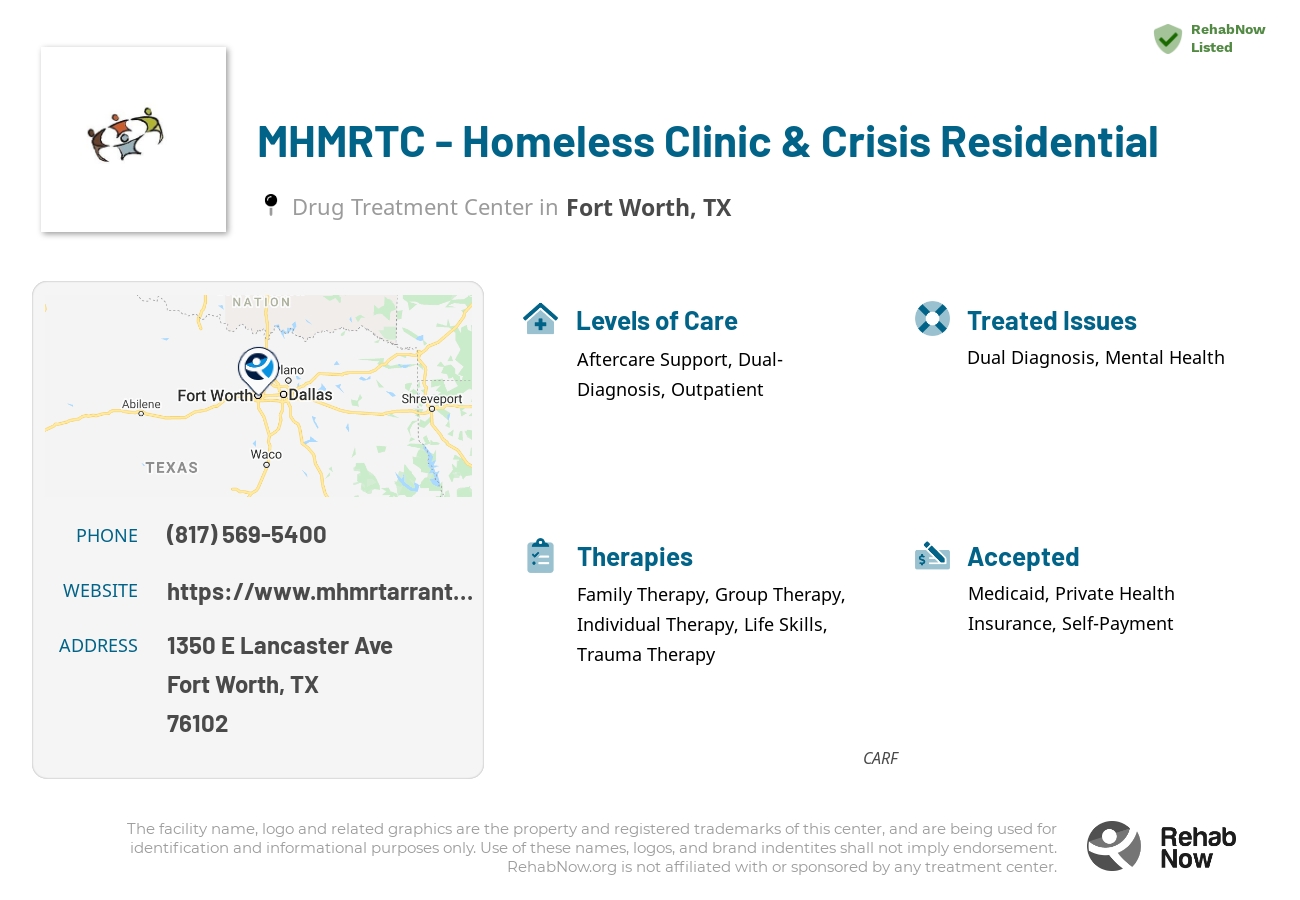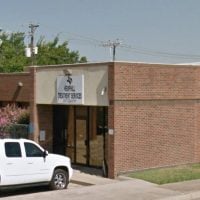
MHMRTC - Homeless Clinic & Crisis Residential
Drug Rehab Center in Fort Worth, Texas
- Mental Health
- Dual Diagnosis
The MHMRTC - Homeless Clinic & Crisis Residential in Fort Worth, Texas is a comprehensive addiction treatment facility that offers a range of services including Dual Diagnosis treatment, Mental Health services, Substance Abuse care, Drug Addiction treatment, and Alcoholism recovery, with the aim of helping individuals achieve a successful and sustainable recovery.
About This Texas Facility
MHMRTC - Homeless Clinic & Crisis Residential in Fort Worth, Texas is a comprehensive addiction treatment facility that specializes in Dual Diagnosis treatment, Mental Health services, Substance Abuse care, Drug Addiction treatment, and Alcoholism recovery. MHMRTC is accredited by CARF and holds a state license, and accepts private health insurance for coverage. Their services include Aftercare Support, Dual-Diagnosis, Outpatient, Residential, and Detox levels of care.
At MHMRTC, individuals suffering from addiction and substance abuse can receive a wide range of treatments and services tailored to their individual needs. These include one-on-one therapy sessions, group therapy, medication management, stress management, relapse prevention, and more. The facility also offers a multitude of addiction aftercare services to help individuals maintain sobriety and independence. In addition, MHMRTC provides comprehensive Recovery Support services, such as academic support, employment assistance, recreational activities, and life skills development. With its comprehensive treatment model, MHMRTC is committed to helping its clients achieve a successful and sustainable recovery.
Genders
Ages
Modality
Additional
Accreditations
State License

CARF
The Commission on Accreditation of Rehabilitation Facilities (CARF) is a non-profit organization that specifically accredits rehab organizations. Founded in 1966, CARF's, mission is to help service providers like rehab facilities maintain high standards of care.
Conditions and Issues Treated
Mental illness includes conditions such as anxiety, depression, schizophrenia, bipolar disorder. It can also happen that mental illness causes drug addiction and vice versa. MHMRTC - Homeless Clinic & Crisis Residential in Texas knows it is vital to diagnose dual diagnosis or co-occurring disorder.
Levels of Care Offered at MHMRTC - Homeless Clinic & Crisis Residential
This center offers a variety of custom treatment tailored to individual recovery. Currently available are Aftercare Support, Dual-Diagnosis, Outpatient, Residential, with additional therapies available as listed below.
Facilities like MHMRTC - Homeless Clinic & Crisis Residential offer a variety of services, such as individual and group counseling and family therapy. During the sessions, you work with a team of experts that include: General physicians, Psychiatrists, Social Workers, and Psychologists. The main goals of outpatient recovery programs are to help addicted individuals reduce drug use and addictive behaviors, eventually becoming entirely sober.
Residential treatment programs are those that offer housing and meals in addition to substance abuse treatment. Rehab facilities that offer residential treatment allow patients to focus solely on recovery, in an environment totally separate from their lives. Some rehab centers specialize in short-term residential treatment (a few days to a week or two), while others solely provide treatment on a long-term basis (several weeks to months). Some offer both, and tailor treatment to the patient’s individual requirements.
Treatment is just a first step in sustaining sobriety. After rehabilitation, counseling for aftercare helps the person adapt to a life without drugs. A sober living facility in Fort Worth, job therapy, or educational assistance may be included in this service, managed by MHMRTC - Homeless Clinic & Crisis Residential. This is when a preventive strategy for relapse starts to take shape.
Therapies & Programs
Therapy plays a major role in addiction recovery. It encourages patients to get to the root of their addiction and learn how to better handle the issues that led to using. Therapy can be conducted in group and one on one settings. In MHMRTC - Homeless Clinic & Crisis Residential‘s individual therapy, the patient meets with the therapist in a one on one setting. This allows them to focus on the underlying issues of addiction and come up with solutions to prevent future abuse.
When the whole family is involved, healing can be far more successful. Family counseling involves genetic factors to the family of the addict. This offers the means to cope with addiction and its underlying emotional disorders for loved ones. It is a helpful method for addicts in helping to adjust to sober living.
Trauma therapy allows people who struggled with a past trauma to face the situation and learn to overcome the situation. Many people who went through trauma early on, struggle with addiction later in life. By addressing the trauma and moving past the issues, it can help someone attending treatment at MHMRTC - Homeless Clinic & Crisis Residential in Fort Worth, TX move forward with their recovery and begin to take a better hold of their sober future.
Training someone on improved life skills allows for someone recovering from an addiction to feel more capable at taking care of him or herself. The skills taught at MHMRTC - Homeless Clinic & Crisis Residential in Fort Worth, TX are daily skills that give a better recovery foundation by simply giving someone the tools they need to survive. They include communicating, time and money management, career guidance, and more.
Payment Options Accepted
For specific insurance or payment methods please contact us.
Is your insurance accepted?
Ask an expert, call (888) 674-0062
Additional Details
Specifics, location, and helpful extra information.
Fort Worth, Texas 76102 Phone Number(817) 569-5400 Meta DetailsUpdated November 25, 2023
Staff Verified
Patient Reviews
There are no reviews yet. Be the first one to write one.
Fort Worth, Texas Addiction Information
Texas is one of the primary hubs for drug smuggling into the country. The border between Texas and Mexico is more than 1,000 miles long. More than 10 million residents use alcohol every year and more than 25% of those are minors. Alcohol and drug use has become so common in Texas that almost 15% of all deaths can be attributed to these substances.
Fort Worth has the highest rate of drug overdoses in the state. 1 out of every 8 Fort Worth residents struggles with a substance abuse problem. In 2016, there were nearly 1,000 overdose deaths in the city. Prescription painkillers are often accessible and cheaper than street drugs. Heroin and methamphetamine are also becoming common addictions. Fort Worth has several detox and rehabilitation facilities that help individuals overcome their dependence on drugs and alcohol.
Treatment in Nearby Cities
- Pharr, TX (456.1 mi.)
- College Station, TX (157.4 mi.)
- Freeport, TX (286.8 mi.)
- Uvalde, TX (285.1 mi.)
- Robstown, TX (343.4 mi.)
Centers near MHMRTC - Homeless Clinic & Crisis Residential



The facility name, logo and brand are the property and registered trademarks of MHMRTC - Homeless Clinic & Crisis Residential, and are being used for identification and informational purposes only. Use of these names, logos and brands shall not imply endorsement. RehabNow.org is not affiliated with or sponsored by MHMRTC - Homeless Clinic & Crisis Residential.









